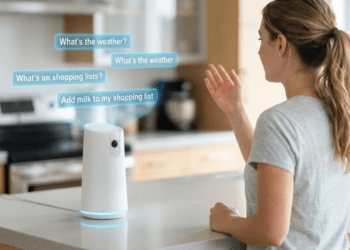
The smart home landscape is about to experience its biggest transformation in years. Google has officially confirmed that Gemini for Home will begin rolling out on October 1, 2025, marking a pivotal moment in the evolution of voice-activated home technology. This isn’t just another update it’s a complete reimagining of how we interact with our smart homes.
The End of an Era: Google Assistant Steps Aside
After nearly a decade of faithful service, Google Assistant is preparing to pass the torch. The familiar voice that has helped millions manage their daily routines is making way for something far more sophisticated. Gemini for Home represents Google’s most ambitious leap forward in home automation technology.
The transition won’t happen overnight. Google plans to begin with an early access program on October 1, gradually expanding to all existing Nest smart speakers and displays. Users will still use the familiar “Hey Google” activation phrase, but everything else changes dramatically.
What makes this transition remarkable is the scope of improvement. While Google Assistant required rigid, specific commands, Gemini for Home understands natural language. You can speak conversationally, just as you would to a knowledgeable friend. This fundamental shift eliminates the frustration of memorizing exact phrases and opens up entirely new possibilities for home automation.
Revolutionary Features That Redefine Smart Home Control
Complex Command Processing
Gemini for Home excels at handling multi-step instructions that would have stumped its predecessor. Instead of issuing separate commands, you can now say, “Dim the lights and set the temp to 72 degrees,” and watch as both actions execute seamlessly.
The AI’s reasoning capabilities shine when dealing with exceptions. Commands like “Turn off the lights everywhere except my bedroom” demonstrate Gemini’s ability to understand context and apply logical reasoning to home automation tasks. This level of sophistication transforms smart homes from collections of individual devices into cohesive, intelligent environments.
Enhanced Media Discovery
Finding entertainment becomes effortless with Gemini’s advanced search capabilities. You can ask for “the song of the year winner from 1990” or “that song from this year’s summer blockbuster about race cars,” and Gemini will locate and play your request across multiple streaming platforms.
This represents a massive improvement over Google Assistant’s often frustrating media search limitations. Gemini’s ability to understand context and make connections between different pieces of information transforms how we discover and consume content. No more struggling with exact song titles or artist names describe what you want, and Gemini figures it out.
Intelligent Home Coordination
Managing family life gets significantly easier with Gemini’s natural language processing. You can request, “Add the ingredients to make an authentic Italian lasagna to my shopping list,” and Gemini will populate your list with all necessary items, from ricotta cheese to fresh basil.
Calendar management becomes more intuitive too. Ask Gemini to “create a calendar event for the season premiere of my favorite show,” and it appears in your Google calendar automatically. The AI understands context, schedules, and personal preferences to make these tasks effortless.
Gemini Live: Your Personal Home Expert
Perhaps the most exciting addition is Gemini Live integration. This feature transforms your smart home devices into conversational partners capable of providing expert advice on virtually any topic. The “Let’s chat” command initiates extended conversations without requiring repeated wake words.
Culinary Assistance That Actually Helps
Cooking becomes collaborative with Gemini Live. Present it with a challenge like, “I have spinach, eggs, cream cheese and smoked salmon in the fridge. Help me make a delicious meal,” and receive multiple recipe suggestions with detailed instructions.
The conversation doesn’t end there. You can ask follow-up questions like “How do I know the pan is hot enough?” or “How do I ensure my eggs are fluffy?” Gemini Live provides real-time guidance throughout your cooking process, adapting to your skill level and preferences.
This capability extends beyond simple recipes. Gemini Live can suggest meal planning strategies, dietary modifications, and even wine pairings. It’s like having a professional chef available 24/7 in your kitchen.
Troubleshooting Made Simple
Home maintenance becomes less daunting with Gemini Live’s troubleshooting capabilities. When your dishwasher stops draining, simply ask, “My dishwasher isn’t draining. Can you walk me through some simple troubleshooting steps?” Gemini Live provides step-by-step guidance, potentially saving you expensive service calls.
The AI can diagnose problems across various home systems, from HVAC issues to plumbing concerns. It draws from vast databases of technical information while presenting solutions in accessible, easy-to-follow language.
Creative Collaboration
Gemini Live serves as an excellent creative partner. Request, “Let’s create a bedtime story for my 6-year-old daughter,” then personalize it: “The main character is a scientist, who is also a princess, and loves corn!” The AI adapts the story to your specifications, creating unique content tailored to your family.
This creative capability extends to party planning, gift ideas, and educational activities. Gemini Live becomes a versatile companion for family entertainment and learning.
Technical Capabilities That Set New Standards
Gemini for Home’s technical foundation represents a quantum leap forward. Built on Google’s most advanced AI models, it offers reasoning, inference, and search capabilities that dwarf previous voice assistants.
The system maintains context throughout conversations, eliminating the need to repeat the “Hey Google” wake phrase during extended interactions. This creates a more natural, flowing dialogue that feels genuinely conversational rather than transactional.
Natural language processing improvements mean you no longer need to memorize specific command structures. Speak naturally, and Gemini understands your intent, even with complex or nuanced requests. This accessibility makes smart home technology more inclusive for users of all ages and technical backgrounds.
Advanced Integration Capabilities
Gemini for Home doesn’t just control individual devices it orchestrates entire home ecosystems. The AI can analyze your devices and suggest automations based on your usage patterns and preferences. It might notice you always dim the lights when watching movies and suggest creating an automatic “movie night” routine.
The integration extends to external services and platforms. Gemini can coordinate between your calendar, shopping lists, streaming services, and smart home devices to create seamless experiences that anticipate your needs.
Market Impact and Industry Implications
The smart home technology market is experiencing explosive growth, with projections showing a 23% increase over the next five years. Google’s Gemini for Home positions the company at the forefront of this expansion, potentially capturing significant market share from competitors.
This announcement puts substantial pressure on competitors, particularly Apple. While Google prepares to deploy advanced AI across its smart home ecosystem, Apple’s Siri remains limited to basic commands and preconfigured automations. Apple’s major Siri update isn’t expected until 2026, giving Google a substantial head start in the AI-powered smart home race.
Amazon faces similar challenges with Alexa, which lacks Gemini’s sophisticated reasoning capabilities and natural language processing. The competition will likely accelerate AI development across the industry, benefiting consumers through rapid innovation and improved features.
Consumer Adoption Factors
Several factors will influence Gemini for Home’s adoption rate. Existing Google ecosystem users will likely embrace the upgrade enthusiastically, especially those frustrated with Google Assistant’s limitations. The backward compatibility with existing devices removes barriers to adoption.
However, user education will be crucial. Many people have developed specific interaction patterns with Google Assistant, and transitioning to more natural language may require adjustment periods. Google’s success will depend on making this transition smooth and intuitive.
Device Compatibility and Hardware Evolution

Google’s rollout strategy demonstrates confidence in Gemini’s capabilities. The AI will be available on all existing Nest smart speakers and displays, including Nest Hubs, Nest Minis, and Nest Audio devices.
This backward compatibility ensures millions of existing users can access Gemini’s advanced features without purchasing new hardware. However, Google is also teasing new devices optimized for Gemini’s capabilities.
Recent teasers suggest updated Nest cameras, speakers, and doorbells with enhanced features like 2K camera support. These new devices will likely showcase Gemini’s full potential while maintaining compatibility with existing smart home ecosystems.
Hardware Optimization
New Nest devices will likely feature improved microphones and processors to handle Gemini’s more complex processing requirements. Enhanced camera capabilities will enable visual recognition features, allowing Gemini to provide context-aware assistance based on what it sees.
The integration of advanced sensors could enable Gemini to monitor home environments more comprehensively, providing proactive suggestions for energy efficiency, security, and comfort optimization.
Pricing Structure and Accessibility
Google plans to offer Gemini for Home in both free and paid versions, though specific feature divisions remain unclear. This tiered approach mirrors successful strategies used by other AI services, allowing users to choose their level of engagement.
The free version will likely include basic smart home controls and simple queries, while the paid tier may offer advanced features like detailed troubleshooting, complex automation setup, and extended Gemini Live conversations.
This pricing strategy makes advanced AI accessible to a broader audience while providing revenue opportunities for Google’s continued development investment. The approach balances democratizing AI technology with sustainable business models.
Value Proposition Analysis
For many users, even the free tier will represent a significant upgrade over current Google Assistant capabilities. The paid tier’s value will depend on the specific features included and how they compare to competing services.
Google’s challenge lies in demonstrating clear value for premium features while ensuring the free tier remains compelling enough to drive adoption and ecosystem engagement.
Privacy and Security Considerations
With great power comes great responsibility, and Gemini for Home’s advanced capabilities raise important privacy questions. The AI’s ability to understand context and maintain conversation history requires sophisticated data processing.
Google must balance functionality with user privacy, ensuring that personal conversations and home automation patterns remain secure. The company’s track record with Google Assistant provides some reassurance, but Gemini’s enhanced capabilities demand even stronger privacy protections.
Users should expect detailed privacy controls and transparency about data usage as the rollout progresses. Google’s commitment to user privacy will likely influence adoption rates and long-term success.
Data Processing and Storage
Gemini’s advanced capabilities require processing vast amounts of data to understand context and provide relevant responses. Google must clearly communicate how this data is handled, stored, and protected.
Local processing capabilities may become increasingly important as users demand greater privacy control. Balancing cloud-based AI power with local privacy protection will be an ongoing challenge.
Competitive Landscape and Strategic Positioning
Google’s aggressive timeline puts competitors in reactive positions. Apple’s delayed Siri improvements and Amazon’s Alexa limitations create opportunities for Google to capture market leadership in AI-powered smart homes.
The October 1 launch date is strategically timed to capture holiday shopping season attention. Families upgrading their smart home setups for the holidays will likely consider Google’s enhanced capabilities when making purchasing decisions.
Microsoft’s absence from the smart home market becomes more pronounced as Google advances. The company’s Cortana retreat leaves an opening that Google is well-positioned to fill with Gemini for Home.
User Experience Evolution
The transition from Google Assistant to Gemini for Home represents a fundamental shift in user experience design. Instead of learning device-specific commands, users can communicate naturally and expect intelligent interpretation.
This evolution reduces the learning curve for new smart home users while providing advanced capabilities for power users. The flexibility to speak naturally while accessing sophisticated features creates a more inclusive and accessible smart home experience.
Accessibility Improvements
Natural language processing improvements particularly benefit users with disabilities or those less comfortable with technology. The ability to speak conversationally rather than memorizing specific commands removes barriers to smart home adoption.
Gemini’s reasoning capabilities can also provide more helpful responses to accessibility-related requests, potentially suggesting home modifications or automation setups that improve daily living for users with specific needs.
Looking Ahead: The Future of Smart Home Interaction
Gemini for Home represents more than just an upgrade it’s a glimpse into the future of human-computer interaction. As AI becomes more sophisticated, our homes will become truly intelligent environments that anticipate needs and provide proactive assistance.
The implications extend beyond convenience. Elderly users may find Gemini’s natural language processing more accessible than traditional interfaces. Families can benefit from personalized assistance that adapts to different household members’ needs and preferences.
Integration with other Google services will likely expand Gemini’s capabilities further. Imagine coordinating your calendar, shopping lists, and home automation based on your Gmail, Google Photos, and location data.
Challenges and Expectations
Despite the excitement, Gemini for Home faces significant challenges. Google Assistant users have experienced frustration with reliability issues, and Gemini must prove it can deliver consistent performance across diverse home environments and user scenarios.
The transition period may present difficulties as users adapt to new interaction patterns. Google must ensure that Gemini’s advanced capabilities don’t come at the cost of basic functionality reliability. Early access users will play a crucial role in identifying and resolving potential issues.
User expectations are high, particularly given Google’s bold promises about Gemini’s capabilities. The October 1 rollout will be closely watched by industry observers and consumers alike, with success or failure potentially influencing the broader AI assistant market.
Conclusion: A New Chapter in Smart Home Technology

Google’s Gemini for Home launch on October 1 marks a watershed moment in smart home technology. By replacing Google Assistant with advanced AI capabilities, Google is betting that natural language processing and sophisticated reasoning will define the next generation of home automation.
The success of this transition will influence the entire smart home industry. If Gemini delivers on its promises, we can expect rapid adoption and competitive responses from other tech giants. If it falls short, the smart home revolution may face significant setbacks.
For consumers, October 1 represents an opportunity to experience the future of home automation. Whether Gemini for Home lives up to its ambitious promises remains to be seen, but one thing is certain: the smart home landscape will never be the same.
The countdown to October 1 has begun. Soon, we’ll discover whether Google’s vision of an AI-powered smart home becomes reality or remains an ambitious dream. Either way, the journey promises to be fascinating, and the implications will resonate throughout the technology industry for years to come.
Sources
MacRumors – Google’s Gemini for Home Starts Rolling Out on October 1
CNET – Google Is Bringing Gemini AI to Its Smart Home Lineup, Starting Oct. 1
Android Authority – Gemini is landing on Google Home devices on October 1
Google Blog – Gemini for Home: Your household’s new, more helpful assistant
Forbes – New Google Nest Smart Home Hardware Set for Launch Next Month










Comments 3